Today Current Affairs: 5th January 2022 for UPSC IAS exams, State PSC exams, SSC CGL, State SSC, RRB, Railways, Banking Exam & IBPS, etc
Table of Contents
Small-Value Digital Payments In Offline Mode:
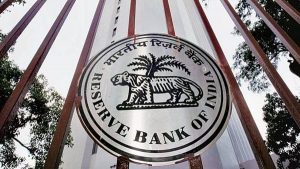
The Reserve Bank of India (RBI) has come out with the framework for facilitating small-value digital payments in offline mode, a move that would promote digital payments in semi-urban and rural areas.
- The framework incorporates feedback received from the pilot experiments on offline transactions conducted in different parts of the country between September 2020 and June 2021.
- An offline digital payment does not require Internet or telecom connectivity.
- Under this new framework, such payments can be carried out face-to-face (proximity mode) using any channel or instrument like cards, wallets and mobile devices.
- Such transactions would not require an Additional Factor of Authentication. Since the transactions are offline, alerts (by way of SMS and / or e-mail) will be received by the customer after a time lag.
- There is a limit of ₹200 per transaction and an overall limit of ₹2,000 until the balance in the account is replenished. The RBI said the framework took effect ‘immediately’.
Single Board Computers:
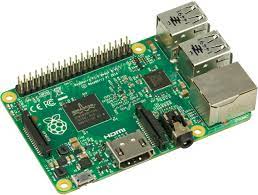
On December 21, NASA launched into space a SpaceX Falcon 9 rocket, which carried the Dragon 2 spacecraft loaded with various equipment for astronauts on board the International Space Station (ISS).
- The launch marked the 24th cargo mission of billionaire Elon Musk’s rocket company to the ISS for the space agency.
- Nestled among these devices were a pair of computers about the size of a set top box. They aren’t the usual laptops or desktops we use every day. The two single board computers (SBC) don’t have a monitor attached to them.
- An SBC is built on a single circuit board, which houses a microprocessor, memory unit, input/output channels, and other features required for a functional computer.
- The duo part of the Dragon 2 consignment, called Astro Pi, were built by the non-profit Raspberry Pi Foundation, in collaboration with the European Space Agency (ESA).
- The mini-computers are equipped with an 8GB RAM, high-quality camera, Google Coral machine learning accelerator, colour and luminosity sensor, and passive infrared sensor.
- All of these sensors are packed inside a space-ready aluminium case that makes the hardware suitable for running codes on the ISS.
- This is the second time the non-profit has sent its SBCs to the ISS.
- In 2015, British ESA astronaut Tim Peake took the first two Astro Pis as part of the Principia mission.
- The ones that reached the ISS recently were upgraded for more advanced computing projects.
Armed Forces (Special Powers) Act Of 1958:
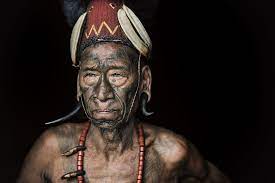
The Konyak Civil Society Organizations, the guardian umbrella of organizations of the Konyaks, has slammed the extension of the Armed Forces (Special Powers) Act of 1958 (AFSPA).
- The Armed Forces (Special Powers) Act of 1958 has been extended in Nagaland for six months from 30th December 2021.
Armed Forces (Special Powers) Act, 1958:
- A reincarnation of the British-era legislation that was enacted to quell the protests during the Quit India movement, the AFSPA was issued by way of four ordinances in 1947.
- The ordinances were replaced by an Act in 1948 and the present law effective in the Northeast was introduced in Parliament in 1958 by the then Home Minister, G.B. Pant.
- It was known initially as the Armed Forces (Assam and Manipur) Special Powers Act, 1958.
- After the States of Arunachal Pradesh, Meghalaya, Mizoram, and Nagaland came into being, the Act was adapted to apply to these States as well.
- The ASFPA gives unfettered powers to the armed forces and the Central armed police forces deployed in “disturbed areas” to kill anyone acting in contravention of law and arrest and search any premises without a warrant and with protection from prosecution and legal suits.
- The law first came into effect in 1958 to deal with the uprising in the Naga Hills, followed by the insurgency in Assam.
Disturbed Areas:
- The Act was amended in 1972 and the powers to declare an area as “disturbed” were conferred concurrently upon the Central government along with the States.
- Currently, the Union Home Ministry issues periodic “disturbed area” notification to extend AFSPA only for Nagaland and Arunachal Pradesh.
- The notification for Manipur and Assam is issued by the State governments.
- Tripura revoked the Act in 2015 and Meghalaya was under AFSPA for 27 years, until it was revoked by the MHA from 1st April 2018.
- The Act was implemented in a 20-km area along the border with Assam.
- Jammu and Kashmir has a separate J&K Armed Forces (Special Powers) Act, 1990.
Konyak:
- The Konyak are the largest tribe, followed by Ao, Tangkhul, Sema, and Angami in Nagaland.
- Other Naga tribes include Lotha, Sangtam, Phom, Chang, Khiemnungam, Yimchungre, Zeliang, Chakhesang (Chokri), and Rengma.
- The term ‘Konyak’ is believed to have been derived from the words ‘Whao’ meaning ‘head’ and ‘Nyak’ meaning ‘black’ translating to ‘men with black hair’.
- They can be grouped into two groups, namely ‘Thendu’, which means the ‘Tattooed Face’ and ‘Thentho’, meaning the ‘White face’.
Free Trade Agreement (FTA):

The Commerce and Industry Ministry said that India is in dialogue with Israel for concluding a Free Trade Agreement (FTA).
- The announcement coincides with the 30th anniversary of the establishment of diplomatic ties between the two countries.
Free Trade Agreement (FTA):
- It is a pact between two or more nations to reduce barriers to imports and exports among them.
- Under a free trade policy, goods and services can be bought and sold across international borders with little or no government tariffs, quotas, subsidies, or prohibitions to inhibit their exchange.
- The concept of free trade is the opposite of trade protectionism or economic isolationism.
India and FTAs:
- After India opted out of the Regional Comprehensive Economic Partnership (RCEP) in November 2019, the 15-member FTA grouping that includes Japan, China and Australia, FTAs went into cold storage for India.
- But in May 2021 came the announcement that India-European Union talks, which had stalled in 2013, would be resumed.
- Both sides are now engaged in internal preparations to take these various strands of work forward.
- Bilateral free trade agreements of India are being negotiated with the United Arab Emirates, the United Kingdom, Australia and Canada.
- The agreement with the UAE was ‘close to finalisation’ while the FTA with Australia was at a ‘very advanced stage.’
DRDO 64th Foundation Day:
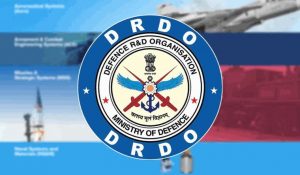
Defence Research and Development Organisation (DRDO) has celebrated the 64th Foundation Day on 1st January, 2022.
- DRDO is the R&D (Research and Development) wing of the Ministry of Defence with a vision to empower India with cutting-edge defence technologies.
- Its pursuit of self-reliance and successful indigenous development and production of strategic systems and platforms such as Agni and Prithvi series of missiles, Light Combat Aircraft, Tejas, multi-barrel rocket launcher, Pinaka, air defence system, Akash, a wide range of radars and electronic warfare systems, etc. have given quantum jump to India’s military might, generating effective deterrence and providing crucial leverage.
- It was formed in 1958 from the amalgamation of the Technical Development Establishment (TDEs) of the Indian Army and the Directorate of Technical Development & Production (DTDP) with the Defence Science Organisation (DSO).
- DRDO is a network of more than 50 laboratories which are deeply engaged in developing defence technologies covering various disciplines, like aeronautics, armaments, electronics, combat vehicles, engineering systems etc.
Various Programmes of DRDO:
- Integrated Guided-Missile Development Programme (IGMDP):
- It was one of Dr. APJ Abdul Kalam’s major works to make Indian defence forces self-sufficient in the field of missile technology.
- The missiles developed under IGMDP are: Prithvi, Agni, Trishul, Akash, Nag.
- Mobile Autonomous Robot System:
-
- MARS is a smart robust robot to handle land mines and Inert Explosive Devices (IEDs) which helps the Indian Armed Forces to disarm them from far distances despite hostile surroundings.
- With some add-ons, this system can even be used to dig the ground for the object and defuse the Improvised Explosive Device by various methods.
- Highest Terrestrial Centre in Ladakh
- DRDO’s centre in Ladakh is at 17,600 feet above sea level at Changla near Pangong lake which is intended to serve as a natural cold storage unit for the preservation of natural and medicinal plants
Sudan’s Abdalla Hamdok Has Resigned As Prime Minister:

Sudan’s Abdalla Hamdok has resigned as prime minister, six weeks after returning to his post following a military coup in October.
- The move deepens uncertainty around Sudan’s political future and a transition towards elections since the 2019 downfall of long-serving ruler Omar al-Bashir.
- Hamdok had served as prime minister for more than two years under a power-sharing arrangement between civilians and the army, until the military toppled him in October, accusing politicians of hostility to the army.
- Under an agreement to partly reverse that coup, he returned to lead a government of technocrats, intended to serve until elections in 2023.
- But his deal with the military was opposed by key political parties and by the protest movement that had brought down Bashir.
- Hamdok had said he would only stay in his post only if he could mobilise political support. But on Jan 2 in a televised address he said he had been unable to unite polarised factions sufficiently to be able to move forward with the transition.
- The fate of the transition will determine the balance of power in Sudan, a country of 46 million people in which a popular uprising had carved a way out from decades of autocracy, internal conflict and economic isolation under Bashir.
- Sudan’s course will have a bearing on a volatile region bordering the Sahel, the Red Sea and the Horn of Africa where international powers are vying for influence. The conflict in Ethiopia’s Tigray region sent tens of thousands of refugees into Sudan one year ago, and renewed tensions over farmlands on the neighbours’ disputed border.
Ayush Aahaar:
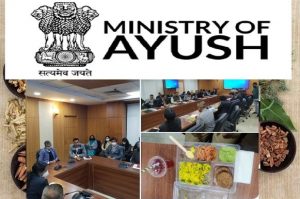
The Ministry of Ayush made a new beginning by making ‘Ayush Aahaar’ available at its canteen at Ayush Bhawan (Delhi).
- It aims to promote a nutritional diet and a healthy living.
National Ayush Mission:
- Government is implementing the Centrally Sponsored Scheme of Mission through States/UTs for development and promotion of Ayush system of medicine.
- The government has decided to continue till 2026.
Aahaar Kranti Mission:
- The mission is dedicated to spreading awareness about nutrition.
New Portals on Ayush Sector:
- Five new portals on Ayush Sector have been launched – CTRI (Clinical Trial Registry of India), RMIS (Research Management Information System), SAHI (Showcase of Ayurveda Historical Imprints), AMAR (Ayush Manuscripts Advanced Repository), and e-Medha (electronic Medical Heritage Accession).
ACCR Portal and Ayush Sanjivani App:
- Ayush Clinical Case Repository Portal: To portray the strengths of Ayush systems for treatment of various disease conditions.
- AYUSH Sanjivani App Third Version: It will facilitate a significant study and documentation regarding the efficacy of selected Ayush interventions, including Ayush 64 and Kabasura Kudineer medicines in the management of asymptomatic and mild to moderate Covid-19 patients.
What Is GitHub?

The open-source software repository service GitHub is in the news after it was used to create and share an offensively named app that sexually harassed Muslim women in India.
- The app used pictures of the women stolen from their social media handles and invited “users” to bid for them.
- IT Minister Ashwini Vaishnaw has announced that GitHub has blocked the user, and the Indian Computer Emergency Response System (Cert-In), the nodal agency for monitoring cyber security incidents, has been asked to form “a high-level committee” to investigate.
What is GitHub?
- GitHub is the world’s largest open-source developer community platform where users upload their projects and code for others to view, edit, and tweak.
- The idea of GitHub is this: any developer can upload whatever software code or app code or software idea they have on the platform, and have others collaborate with them to help improve it, find errors, and fix problems.
- The platform uses the software Git, which was created in 2005 by Linus Trovalds, the developer of the open-source operating system Linux, to track changes in a set of files and for coordination in software development.
Nuclear Weapons:
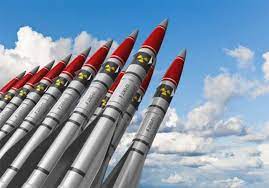
Five global nuclear powers pledged to prevent atomic weapons spreading and to avoid nuclear conflict, in a rare joint statement ahead of a review of a key nuclear treaty later this year.
- “We believe strongly that the further spread of such weapons must be prevented,” said permanent UN Security Council members China, France, Russia, the U.K. and U.S.
- The statement was issued after the latest review of the Treaty on the Non-Proliferation of Nuclear Weapons (NPT) — which first came into force in 1970 — was postponed from its scheduled date of January 4 to later in the year due to the COVID-19 pandemic.
- The statement comes as tensions between Russia and the United States have reached heights rarely seen since the Cold War over a troop build-up by Moscow close to the Ukrainian border.
- That has raised fears that the Kremlin is planning a new attack on its pro-Western neighbour.
- The rise of China meanwhile has also raised concerns that tensions with Washington could lead to conflict, notably over the island of Taiwan.
- Beijing considers Taiwan part of its territory and has vowed to one day seize it, by force if necessary.
Lignite Mining:
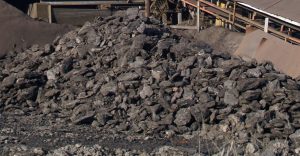
The Congress government in Rajasthan is preparing an ambitious road map in the New Year for mining of lignite in Bikaner district’s Gudha West and the installation of a new lignite-based thermal power plant in its vicinity.
- The joint action plan is expected to significantly enhance the State’s power generation capacity.
- Lignite mining capacity of 10 lakh tonnes was available in Gudha West, where there was a plan to set up a power plant of 125 to 135 MW capacity in 2005 as well.
- The Central Government’s Neyveli Lignite Corporation is already generating electricity in its power plant at Gudha East, while the power is being produced by the private sector in Bikaner district’s Barsingsar village.
- Lignite, often referred to as brown coal, is a soft, brown, combustible, sedimentary rock formed from naturally compressed peat.
- It has a carbon content around 25–35%, and is considered the lowest rank of coal due to its relatively low heat content.
- Lignite is mined all around the world and is used almost exclusively as a fuel for steam-electric power generation.
- The combustion of lignite produces less heat for the amount of carbon dioxide and sulfur released than other ranks of coal. As a result, environmental advocates have characterized lignite as the most harmful coal to human health.




